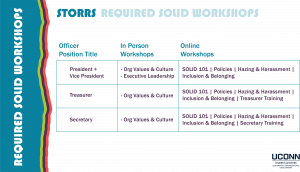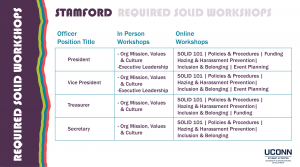Student Organization Support – General Statement
The University of Connecticut is committed to providing student leaders with a variety of resources to support the operations of their organizations and their individual development.
Note on Advisement and Consultation. Professional campus / student activities staff are available to discuss requests, questions, comments, or concerns with student organizations. It is recommended that student organization leaders schedule appointments with their Primary Campus Student Activities Staff member for support. To schedule an appointment, you can refer to Appendix A to find a list of campus staff and their contact information.
2.1 SOLID Training Requirements
SOLID (Student Organization Leaders Intentional Development).
The SOLID program is intended to ensure that student organization leaders are properly equipped to lead groups successfully and utilize all the resources available. SOLID workshops offer valuable information on campus policies, UConntact, and tailored strategies for each student leader position.
The chart below outlines training requirements for student organization leaders. For workshop descriptions and requirements please visit http://solid.uconn.edu/solidworkshops
2.2 RSO Status
The status of an RSO refers to their position within the University. An RSOs status may vary based on their registration process, conduct on campus, completion of required trainings, and more.
Active. Active organizations are considered to be in good standing. This means they have met all requirements as it relates to their respective tier. This includes registration and renewals, SOLID Trainings, and appropriate membership appointments.
Active organizations are listed on UConntact, eligible for space, and may have access to student funding Banking Services, and advisement requests.
Frozen. Frozen organizations have not yet met all SOLID requirements and are not eligible for funding, space, UConntact, or other access to services. Please contact solid@uconn.edu for information related to your status.
Locked. Locked organizations are administratively suspended temporarily based on conduct or failure to complete requirements and lose access to all services. (i.e., gross misconduct or insubordination, misuse of logo and branding).
Inactive. Inactive organizations have been disbanded and are no longer registered with the University.
Organizations that have not achieved an Active status after an academic semester may be subject to becoming ‘Inactive’.
2.3 Organization Advisors (Tier II Only)
All Tier-II registered student organizations are required to have an RSO Advisor. RSOs are encouraged to find an RSO advisor who shares an interest or has experience in some aspect of the organization’s mission or activities.
- Advisors must either be full-time Faculty, Professional Staff, Graduate Assistant, Graduate Teaching Assistant, or active Adjunct Faculty of the University of Connecticut.
- Classified Staff and UConn Affiliates are not permitted to serve as RSO advisors.
- Graduate Students are not permitted to be an RSO Advisor for a graduate student organization.
- Advisors must have job responsibilities at the primary campus indicated by the RSO.
- Advisors are required to be listed and confirmed as an Advisor on UConntact – our Student Organization Management System.
Note: Advisors may be required to complete online training before assuming their role.
An RSO advisor should act as a guidepost for the student organization leaders and serve as the RSO’s primary point of contact. The exact role of the RSO advisor should be determined by the student organization and the advisor. This role may vary from organization to organization, based on the organization’s needs and goals. Each year, the student leadership of the organization and the advisor should meet to determine the role and expectations of the advisor and the advisor's expectations of the students.
- Advisors discuss opportunities, guide the decision-making process; and assist in developing group dynamics.
- Advisors meet with organization leaders regularly to discuss and develop goals and set expectations.
- Advisors serve as a source of information and continuity to the organization members that transition each year.
- Advisors act as a liaison between the University and the organization.
- Advisors challenge students' thought processes, creativity, and desire to go beyond the status quo.
- Advisors offer advisement in areas such as organization mission, goals, program/event content, and purpose.
- Advisors assist RSOs in their event planning by meeting with the RSO to discuss event logistics and safety concerns. An RSO advisor may be required to sign off on event paperwork.
- Advisors sign documents related to banking business for organizations that have a Student Activities Financial and Program Support Bank Account. (Storrs Campus Only)
Further, an RSO Advisor does not:
- Have voting rights in groups,
- Serve as a member of the organization’s board of directors, executive council, or similar governing body,
- Make financial decisions,
- Approve programs,
- Make officer/roster decisions, or
- Have the authority to represent the organization's views.
These items strictly remain the responsibility of the students within the RSO.
Note on RSO Advisor Liability. Concerning an Advisor’s liability/exposure related to the activities of their RSO:
RSO Advisors, as State employees, are immune from personal liability except for wanton, reckless, or malicious conduct within the scope of their employment. State employees are afforded additional protection when they act within their employment scope and execute their duties without wanton, reckless, or malicious conduct. For more information about the scope of employment, indemnification, or personal liability as an employee, please refer to Connecticut General Statutes 4-165 and 5-141d. Follow this link for more information: https://www.cga.ct.gov/current/pub/chap_053.htm#sec_4-165
Replacing an Advisor. If a student organization advisor resigns or is no longer employed by the university (due to retirement, graduation, departure, etc.), the organization is responsible for seeking a new advisor within 30 days of notice. Once a new advisor has been chosen, please inform the appropriate student activities staff by completing the online Advisor Change Form on UConntact.
Community Advisement & Support. Alongside the official RSO advisor, student organizations may receive support from the community, including alumni, graduate students, and campus affiliates. It is not unusual for student organizations associated with national organizations (such as fraternities and sororities) to receive support from graduates or alumni. However, the University will only recognize the RSO advisor registered on the organization's official registration materials as the primary point of contact and collaborator with the RSO.
2.4 Organization Functions at Non-Primary Campus
An RSO wishing to hold a function at a campus other than their Primary Campus should notify their Primary Campus Student Activities Staff Member and submit a request to the Non-Primary Campus office responsible for reviewing and approving space reservation requests.
Only Active RSOs are eligible to submit such reservation requests. The responsible office/department at each campus charged with reviewing and approving space reservation requests will have ultimate authority regarding decisions about space reservation requests.
The approval to host/hold a function at a non-primary Campus applies only to the specific, individual function for which the request had been made and approved. Subsequent functions/events/activities will each require their approval.
2.5 RSO Changes and Requests
Changing a Student Organization’s Name. Student Organizations may submit a request to change their RSO’s name by emailing SOLID@uconn.edu. Additional forms/constitution updates may be required.
Dissolving a Student Organization. At times, student organizations may choose to cease their operations due to various reasons such as low interest, dwindling membership, or a decision to merge with another organization. To disband an organization, please send an email to SOLID@uconn.edu. Before disbanding, it is important to resolve or close any open Student Activities Financial and Program Support bank (SABS) account or outstanding debts associated with the organization. Additionally, if the organization has received materials or equipment funded by the respective student government, it is necessary to return those items.



